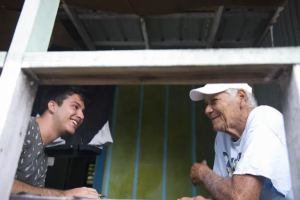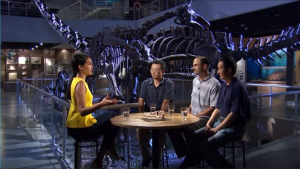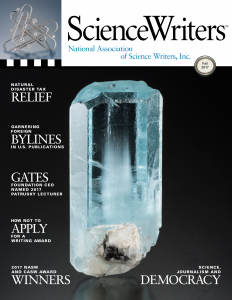By Rodrigo Pérez Ortega
Some of the biggest science stories, from climate change to gene editing to infectious disease, are global stories. Journalists based outside the United States and Europe are well-positioned to find and report these kinds of stories. When the Zika outbreak swept Brazil in 2015, for example, Brazilian journalists were the first to cover the event. But it can be a challenge to place those stories in U.S. and European publications.
So why don't foreign bylines appear more often in such publications? In a roundtable conversation conducted by email, editors and freelance writers were asked about the challenges writers face in working across international boundaries.
The editors:
- Rich Stone, who oversees Science's international news coverage
- Richard Van Noorden, acting European bureau chief for Nature
- Ochieng' Ogodo, a Kenyan science journalist who coordinates correspondents and coverage from sub-Saharan Africa for SciDev.Net and has written for African, U.K., and U.S. publications
The writers:
- Fatima Arkin, Philippines-based journalist who writes for Foreign Policy, SciDev.Net, and Devex
- Emiliano Rodríguez Mega, journalist from Mexico who covers Latin American research and science policy for Science, Scientific American, SciDev.Net, and Nature
- T.V. Padma, India-based science journalist who writes for Nature, New Scientist, Physics World, Chemistry World, and other outlets

(photo by Antonio Busiello)
Rich: You might think it's a language barrier, but the sophistication of a journalist's English is secondary to the ideas being pitched. Writers who struggle to break into Science often have a hard time weighing a story's importance. For example, a pitch about a personality conflict in the Chinese Academy of Sciences is possibly of huge interest inside China, but the story doesn't have legs outside China.
Richard: Any editor will want a science story from somewhere across the world if the research is newsworthy, exciting, and internationally cutting edge. But too often I get pitches that don't articulate that because journalists haven't asked anyone outside the research team how important the science is or even Googled to find out what else has been studied or written about in the area.
Ochieng': One of the reasons that it's difficult to break into publications is it's challenging to persuade editors that foreign journalists can write well and produce quality stories. I am aware of instances where some editors have ignored inquiries about contributions from people outside the U.S. or U.K. There is also a preference by editors to use writers from the U.S. or U.K. who are based in foreign countries, and not those who were born and brought up there, even though they may be much more conversant with these places.
Emiliano: Nature, Science, and SciDev.Net are examples of news organizations that have tried to diversify their pool of freelance writers. But it's just as easy to find English-language publications that have not bothered to reach out to foreign journalists. English is not my first language, yet I've learned that as long as you can tell a good story it doesn't matter whether you have perfect grammar. It is on us to think thoroughly about the angles that fit the needs of our editors. There are also lots of reporters who just don't feel confident enough to send pitches to U.S./U.K. outlets. Fear of rejection can be an obstacle.

Stone is sitting between two Chinese paleontologists. (photo Courtesy of On China)
Richard: By spotting great work, asking trusted reporters who live or travel in a region for connections to reporters there, and looking for contacts at networking events, such as the World Conference of Science Journalists. It takes effort, as it can be tricky to find good reporting in a foreign language [if you don't speak the language]. Sometimes, traveling to a particular region is what's needed.
Rich: Most editors are open to working with new writers from regions in which their news coverage is spotty or nonexistent. The challenge is establishing a connection. Editors are busy. Most of the time, I rely on writers coming to me with ideas. If a colleague or I spot a story that we'd like to cover, we'll invariably assign it to someone we know. If writers want to break into a publication, they should do their homework: have a sense of the kinds of stories we run and adequately research a pitch. Putting a name to a face can't hurt, so I'll be hoping to meet some promising writers at WCSJ.
Rodrigo: Editors, given that many international pitches come from writers you haven't met and whose work you may not be familiar with, what can foreign journalists do to earn your trust, when pitching for the first time?
Richard: An editor wants to know about a reporter's experience before trusting them with an assignment. The first step to familiarity and trust is as simple as a Skype conversation, with the reporter sending over a CV, some story clips, and a few ideas in advance. The editor can lay out what kind of stories the publication is interested in, the audience, and information they like to see in pitches. The reporter can bat around a few ideas and story approaches. In other words, overseas reporters approaching an editor with a pitch out of the blue need to also pitch themselves.
Rich: I prefer brief initial queries. If it's something we've already covered or have a writer working on, the writer can take the pitch to another publication or look for a new idea without investing too much time at the outset. If the query is promising, I'll ask for more info and if it's not in my area of expertise, circulate it to colleagues for feedback before making an assignment. Writers should not be dispirited by striking out on a pitch. Most of my best overseas writers struggled at the outset to identify good stories for Science before hitting their stride.

Stone is sitting between two Chinese paleontologists. (photo Courtesy of On China)
Padma: I don't use Skype conversations or pitch myself along with a story. My pitches are in basic English; a language barrier is not really an obstacle. I believe that one should not fixate over whether they have broken into a U.K. or U.S. market or not. Enjoy your science writing first, and explore and decide what kind of science reporting is your forte.
Emiliano: In 2015, I attended on the AAAS meeting in San Jose, California, thanks to an NASW travel fellowship. I had almost no experience in journalism and felt out of place. Fellows are assigned an experienced mentor/editor and I was paired with Lizzie Wade, Latin America correspondent for Science. After the conference, Lizzie encouraged me to write for Science. After months of hunting down possible stories and getting a few pitches rejected, I landed my first story. With Nature, I used a different approach. I met Lauren Morello, Nature's U.S. news editor, and pitched a story about budget cuts in Argentina, sending along my CV and clips. The story wasn't published but that pitch helped when Lauren passed on my contact info to Richard Van Noorden who assigned me a story on Peru's National Council of Science, Technology and Technological Innovation canceling its subscription to Elsevier/ScienceDirect.
Fatima: I have no background in science, having studied history and international development. Shortly after I moved from Canada to the Philippines I ran into one of SciDev.Net's coordinators in an elevator. We talked. One thing led to another and now I write consistently for him. The SciDev.Net community is very supportive. My editor recommended me to other publications in the U.K. and the U.S. Today, I write regularly for several of them. That said I find it challenging to get ahold of editors if I don't already have a connection. When I have met editors in person, I found that talking with them even for five or 10 minutes was infinitely more productive for both parties than sending countless emails. Email is not always the best medium of communication!
Rodrigo: Editors, what challenges have you had working with foreign journalists on stories and how did you address them?
Ochieng': The ability to present stories to an audience, far removed from their geographic settings, in a manner that will elicit interest in them. Lack of resources for in-depth reporting can also be a challenge. Most journalists in the U.S./U.K. have the advantage of easy access to reliable internet. Journalists working in Africa find it harder because of lack of resources that would help them not only to hand in an assignment quickly but also allow for additional research to give their pieces the depth and uniqueness that U.S./U.K. publications require.
Rich: On rare occasions I've encountered writers who are ardently nationalistic, and their first drafts have boosterish comments and slogans. But we were still able to work together to get stories into shape for publication. The bottleneck for getting stories into the magazine from anywhere in the world is a dearth of enterprising and innovative story ideas. I can't emphasize enough how important it is for writers to get out there and talk with people and turn over stones in search of good ideas. Skype chats between writers and editors at any stage of the working relationship are a very good thing.
Richard: It's important to describe your country's politics from the outside so that international readers can understand it. If I'm unfamiliar with the politics and history of a region, I'll raise many more questions about basic points that you probably take for granted because you never have to explain them for domestic readers.
Padma: Sometimes I fear that adding political background will make my pitch longer than a commissioned story. But if you want to explain why the news is important, you have to provide this background info. My query to the editors, therefore, is: Would you be put off by a long pitch that has all the background info?
Rich: No, but there are caveats. I discourage writers from investing too much time on an initial pitch. Researching a pitch and writing a pitch are two very different tasks. All editors will expect a well-researched pitch, but the pitch itself may need to be tailored to an individual editor's needs.
Rodrigo: Have you noticed differences in the way journalism is done in other countries compared to the way it's done in the U.S. and U.K.? If so, in what ways have you had to adapt your approach to reporting, writing, or editing?
Rich: If the story is solid and compelling, we'll work patiently with a foreign writer, especially those who haven't written for us before, to reshape a story into our style. Edits are demanding, but the end result is a story we are both proud of.
Emiliano: Good journalism is the same, or at least very similar, in the U.S. and U.K. as it is in Mexico, the Philippines, India, or Kenya. I've had to adapt to the style of specific publications the same way that I adapt to the style of different Mexican outlets, for example.
Rodrigo: Have you ever encountered special logistical or administrative challenges, such as payment issues, when working with foreign journalists or outlets?
Padma: There can be some to-and-froing of payment if the bank abroad and your bank at home deal via an intermediary bank.
Rich: From time to time, payments wired to a foreign bank account don't go through for trivial or unknown reasons.
Emiliano: The biggest challenge as a foreign contributor is that my nationality forces me to work on a freelance basis for outlets. There have been occasions when I applied for internships at U.S.-based outlets but lost the opportunities because I didn't have a permit to work in the United States.
Rodrigo: Any final thoughts or advice you'd like to offer foreign writers or editors who work with them—or hope to?
Emiliano: Writers, if you want to break into U.S. and European publications, don't be afraid to put yourselves out there. Yes, you will fail and your pitches will get rejected and it will take some time to figure
_"Why is it so hard for foreign journalists to break into U.S. and European outlets?" ©2017 Rodrigo Pérez Ortega. Reprinted with permission of the author. This article first appeared in The Open Notebook, Aug. 29, 2017.
Rodrigo Pérez Ortega, a freelance science writer based in Mexico City, was a 2017 TON fellow sponsored by the Burroughs Wellcome Fund. He is committed to raising awareness about science and science journalism in Latin America.
(NASW members can read the rest of the Fall 2017 ScienceWriters by logging into the members area.) Free sample issue. How to join NASW.
